Throwback Thursday is when we trawl through the That's archives for a work of dazzling genius written at some point in our past. We then republish it. On a Thursday.
By Erik Crouch and Zoey Zha
Shi Zhongpeng is going to die today. If he’s lucky, he may die more than once. In the morning, he could be hit by a sniper. In the afternoon, he might perish in a storm of quickly-shot arrows along with a dozen of his beige-uniformed colleagues. Before dinner, he could suffer any number of fates, from getting his heart pulled out of his chest to a well-thrown hand grenade taking down his prop-plane fighter.
Shi isn’t a WWII-era Japanese casualty, he just plays one on TV. “I’ll be on six or seven different sets daily, if I’m lucky,” he says. “I’ve died more than 30 times in one day.”
Shi has a stunt man’s build: fit and strong, with a gymnastic talent for spins and flips, he is perfectly suited to being blown up. At 27 years old, Shi has been working in the film industry for more than a decade. He exclusively plays Japanese ‘devils,’ the extras who die en masse in the scores of Chinese films and TV series produced each year depicting the 1937-1945 Second Sino-Japanese War.
Caijing estimated that 700 million Japanese soldiers were killed on screen in 2012, “enough corpses to circle the earth three times."
“When it’s around New Year or a national holiday, some of the sets will be short on extras and I can take more roles, and die more times,” he says. He makes about RMB70-80 per day, and has heard that actors with dialogue make RMB200-300, but doesn’t know that first-hand. Having appeared hundreds of times on screen – sometimes dying in one scene yet appearing in the background of another – his characters have never lived to tell the tale.
In fact, he doesn’t typically do much more than die. “I don’t really need acting skills, since I’ve got no lines,” he says. “I’ve had the chance to do one or two fight scenes, which makes me really happy.” (Even though he does not, of course, win the fights.)
Shi does most of his dying in Zhejiang Province, at the massive Hengdian World Studios campus. The studios have hosted cinematic icons like director Zhang Yimou and actors Jackie Chan and Jet Li, but are better known as the ‘Hengdian Anti-Japanese Revolutionary Base,’ thanks to the massive number of beige-suited invaders regularly liquidated on screen.
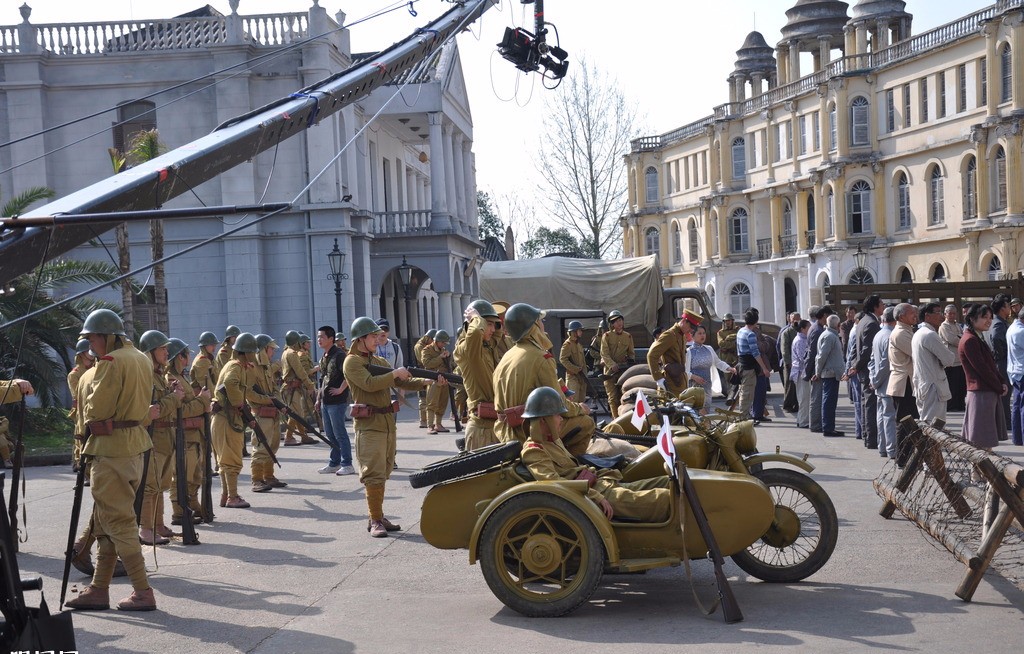
The campus has become known as the ‘Hengdian Anti-Japanese Revolutionary Base,’ thanks to the massive number of beige-suited invaders regularly liquidated on screen.
Of the 150 films and TV shows churned out by Hengdian in 2012, about a third depicted the Japanese invasion. Caijing estimated that a staggering 700 million Japanese soldiers were killed in that year alone, “enough corpses to circle the earth three times.”
The campus employs more than 30,000 actors – some 60 percent of whom have taken roles as Japanese ‘devils’ – and features massive replicas of iconic Chinese sites, ranging from the Old Summer Palace to the streets of Hong Kong. These meticulous sets are periodically soaked by the fake blood packets erupting from actors like Shi as they are karate chopped, annihilated by cannons or face a plethora of equally unpleasant fates.
The action scenes frequently trespass into the absurd. One screenshot from a war film went viral last year with its depiction of a beige-suited ‘devil’ being bloodily karatechopped in half from head to toe. The image received thousands of shares and comments on Weibo, ranging from the sarcastic “So every Japanese has a ‘tear along the perforated line’ label written on their head?” to the depressed “Glamorizing violence, what a disgrace!”
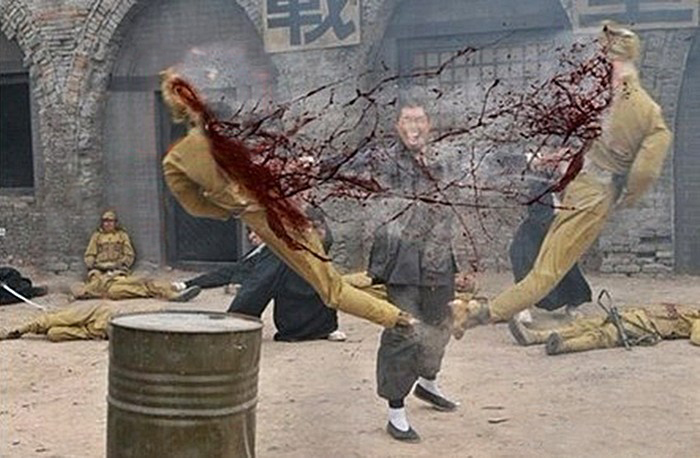
This photo went viral online due to its
comical depiction of wartime violence
It seemed to be a tipping point, and soon thereafter actor Chen Daoming criticized the war film industry for being too “entertainment oriented.” Many agreed. Ni Jun, associate professor at the Cinema and Television Department of the Central Academy of Drama doubled down on Chen’s claims and told CCTV that some of the films depicting the war “go as far as to insult the intelligence of audiences … The history of the Sino-Japanese war was one of great tragedy and aggression. It is worth remembering as an important piece of history, not something to be spoofed.”
Several TV programs were taken off the air in response to the accusations of excessive violence and ludicrous stunts. A representative from the State Administration of Radio, Film and Television (SARFT) issued a statement last May saying that many films were “not respecting history,” and it appeared that Shi Zhongpeng and his colleagues might soon be out of the job.
While the number of decapitations and throwing-knives fell, something else was on the rise: styled hair and lipstick.
It wasn’t the death of the genre, however, just a shift. While the number of decapitations and throwing-knives fell, something else was on the rise: styled hair and lipstick.
The TV drama To Advance Toward Gunfire has become a prime example of the genre’s new trend. The main Chinese lead, actor Nicky Wu, plays a bandit taking part in the guerilla conflict against the Japanese. He has a mane of fresh-from-the-salon hair, a tight-fitting leather jacket and a motorcycle that would make Steve McQueen blush. He is joined by a female comrade in arms who touts a stylish leather bag and impeccable make-up.
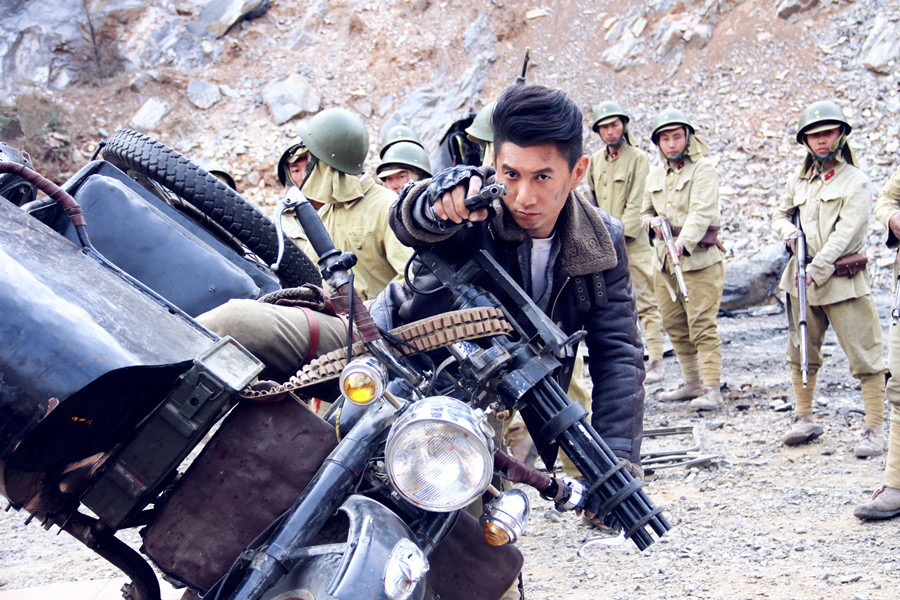
Actor Nicky Wu shows off his skills (and hair) in To Advance Toward Gunfire
Similarly, the Blue Wolf drama series featured clear complexions, elegant wardrobes and romantic scenes reminiscent of a soap opera. As if that weren’t enough, the series was embroiled in controversy after it was caught lifting a theme song from Japanese anime show Naruto: Shippuden which, considering the subject matter, was dubbed “too ironic” by online viewers.
“If ‘fighting the devils’ becomes a fashion show, it’s just too over the top,” the China Youth Daily sighed in September. A week later, the China Daily lamented that the films and TV shows were “absurdly fictionalized” and that young stars “exude too much confidence even during one of the most trying times in China's history.” A time that did not see much in the way of hair product or eye liner.
The war drama market is saturated: hundreds of episodes and films are churned out each year, and producers struggle to get their work noticed. Extreme, cartoonish violence seemed able to draw a crowd until recently, and the latest trend of high-fashion and glamorization seems to be on the way out as well. That doesn’t mean the genre is dead: it just needs to once again reinvent itself, in a way that is respectful and somber enough to avoid ridicule while still being able to attract viewers.
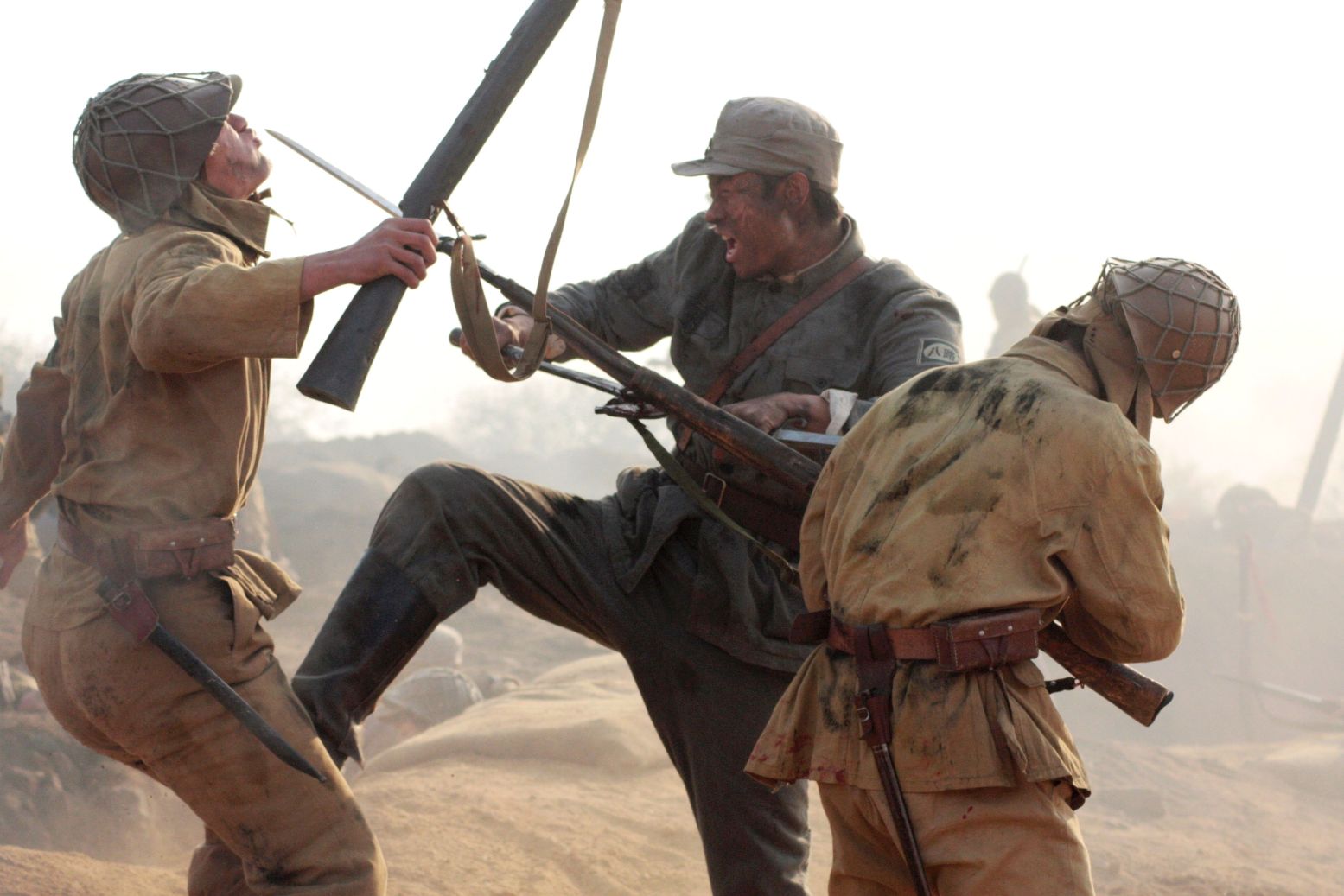
The war drama market is saturated: hundreds of episodes and films are churned out each year, and producers struggle to get their work noticed.
There might be changes in presentation and style, but one thing remains steady: the genre’s need for expendable Japanese soldiers. Shi Zhongpeng dreams of one day being on the fashionable, violence-inflicting side of the equation.
“I want to play a better role, like a soldier in the Red Army,” he says. But for now, he will continue to don the beige, soon-tobe-blood-soaked garb of the Japanese invaders. The genre’s shifts and controversies don’t affect him much.
“Before we start filming, I come on set and talk with the camera staff and director to figure out the spot where I should die, and how high I need to jump,” he says. “Those are the things I need to know. The rest is not my business.”
This article first appeared in the November 2014 issue of That's Shanghai. To see more Throwback Thursday posts, click here.







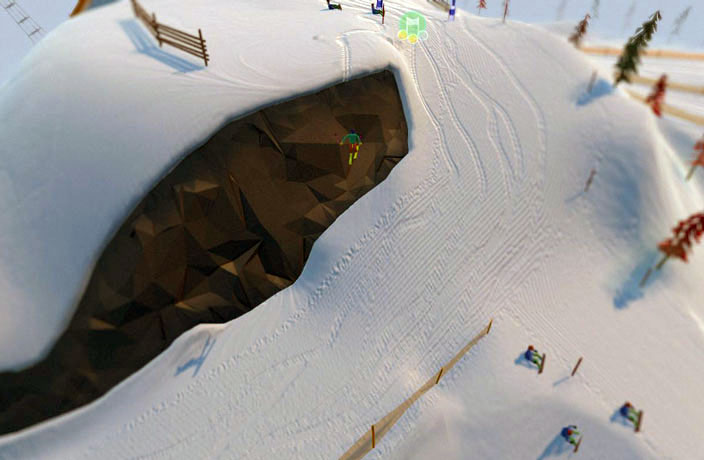














0 User Comments